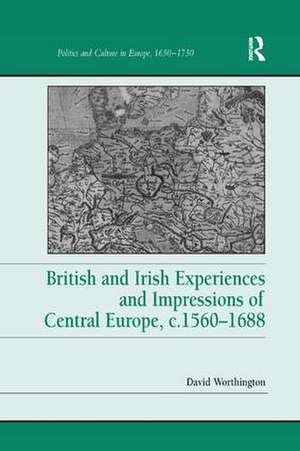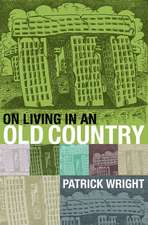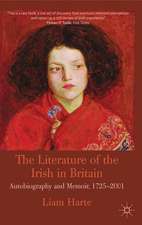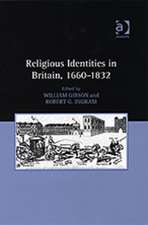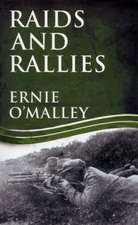British and Irish Experiences and Impressions of Central Europe, c.1560–1688
Autor David Worthingtonen Limba Engleză Paperback – 15 noi 2016
| Toate formatele și edițiile | Preț | Express |
|---|---|---|
| Paperback (1) | 469.34 lei 43-57 zile | |
| Taylor & Francis – 15 noi 2016 | 469.34 lei 43-57 zile | |
| Hardback (1) | 1056.28 lei 43-57 zile | |
| Taylor & Francis – 28 ian 2012 | 1056.28 lei 43-57 zile |
Preț: 469.34 lei
Nou
Puncte Express: 704
Preț estimativ în valută:
89.82€ • 93.43$ • 74.15£
89.82€ • 93.43$ • 74.15£
Carte tipărită la comandă
Livrare economică 14-28 aprilie
Preluare comenzi: 021 569.72.76
Specificații
ISBN-13: 9781138265677
ISBN-10: 1138265675
Pagini: 256
Dimensiuni: 156 x 234 x 22 mm
Greutate: 0.45 kg
Ediția:1
Editura: Taylor & Francis
Colecția Routledge
Locul publicării:Oxford, United Kingdom
ISBN-10: 1138265675
Pagini: 256
Dimensiuni: 156 x 234 x 22 mm
Greutate: 0.45 kg
Ediția:1
Editura: Taylor & Francis
Colecția Routledge
Locul publicării:Oxford, United Kingdom
Notă biografică
Dr David Worthington, The Centre for History, University of the Highlands and Islands, Dornoch, Scotland, UK
Recenzii
'The book rests on a fresh and challenging methodology. It offers a rich range of individuals and texts, most of which are poorly known. Finally it reminds historians that early modern Europeans held much more in common than traditional historiographies have led us to believe.' - Renaissance Quarterly
'Overall, this body of research and the resulting monograph make an excellent contribution to our understanding of early modern emigration. The author’s thematic approach in combination with his detailed awareness of the politics of the area mean that each chapter does far more than simply analyze emigration patterns but provides a window onto central and eastern Europe.' - H-Albion
'To sum up I must say that David Worthington’s work is a very interesting and a much needed study of the history of Central Europe. In this case it is even more important because of its comparative perspective of the region. Moreover, British and Irish Experiences and Impressions of Central Europe is well written and offers interesting thematic approaches towards the problem, a cleaver structure, and a detailed portrait of the archipelago people in Central Europe.' - Seventeenth-Century News
'The structure of the book, as well as the composition of the chapters, is very clear - elegant, in fact - and it is a pleasure to follow the author's arguments.' - Journal of Scottish Historical Studies
'His work opens up questions not only about connections between the British Isles and Habsburg lands during this period but also about the potential of comparative analysis between the composite British and Habsburg monarchies, with Scotland playing the role of subdued Bohemia and Ireland as troublesome Hungary.' - European History Quarterly
'Worthington’s present work contributes to the knowledge of the engagement of the British and Irish who established networks of contacts across the region... This book makes an important contribution to scholarship on the continuous British and Irish interconnections with continental Europe already under examination notably by Steve Murdoch, Allan Macinnes, Arthur Williamson and Peter Bajer.' -
DARIUS VON GÜTTNER-SPORZYŃSKI, University of Melbourne, Australasian Journal of Irish Studies
'Overall, this body of research and the resulting monograph make an excellent contribution to our understanding of early modern emigration. The author’s thematic approach in combination with his detailed awareness of the politics of the area mean that each chapter does far more than simply analyze emigration patterns but provides a window onto central and eastern Europe.' - H-Albion
'To sum up I must say that David Worthington’s work is a very interesting and a much needed study of the history of Central Europe. In this case it is even more important because of its comparative perspective of the region. Moreover, British and Irish Experiences and Impressions of Central Europe is well written and offers interesting thematic approaches towards the problem, a cleaver structure, and a detailed portrait of the archipelago people in Central Europe.' - Seventeenth-Century News
'The structure of the book, as well as the composition of the chapters, is very clear - elegant, in fact - and it is a pleasure to follow the author's arguments.' - Journal of Scottish Historical Studies
'His work opens up questions not only about connections between the British Isles and Habsburg lands during this period but also about the potential of comparative analysis between the composite British and Habsburg monarchies, with Scotland playing the role of subdued Bohemia and Ireland as troublesome Hungary.' - European History Quarterly
'Worthington’s present work contributes to the knowledge of the engagement of the British and Irish who established networks of contacts across the region... This book makes an important contribution to scholarship on the continuous British and Irish interconnections with continental Europe already under examination notably by Steve Murdoch, Allan Macinnes, Arthur Williamson and Peter Bajer.' -
DARIUS VON GÜTTNER-SPORZYŃSKI, University of Melbourne, Australasian Journal of Irish Studies
Cuprins
Introduction The Scoti and their Successors; Chapter 1 Commentators and Comparisons; Chapter 2 Court and Crown; Chapter 3 Cavaliers and Christendom; Chapter 4 Calvinists, ‘the Curious’ and Commerce; Chapter 5 Catholic Colleges and Clergy; concl Conclusion;
Descriere
Whilst much recent scholarly work has sought to place early modern British history within a broader continental context, most of this has focused on western Europe. In order to redress the balance, this new study by David Worthington explores the connections linking British and Irish emigrants, exiles, travellers and merchants with the two major dynastic conglomerates east of the Rhine, the Austrian Habsburg lands, and Poland-Lithuania. This examination of the diverse range of Irish, Scottish, Welsh and English religious, intellectual, political, military and commercial contacts with central Europe provides not only a more balanced view of British history, but also continues the process of reintegrating the histories of eastern and western Europe.
